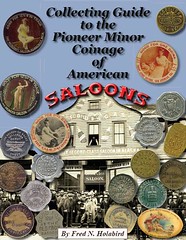
PREV ARTICLE
NEXT ARTICLE
FULL ISSUE
PREV FULL ISSUE
V11 2008 INDEX
E-SYLUM ARCHIVE
NEW BOOK: PIONEER MINOR COINAGE OF AMERICAN SALOONS BY FRED HOLABIRD
Fred Holabird is working on a new book about American Saloon tokens. At my request he forwarded some excerpts for publication in The E-Sylum. The following is taken from the book's Introduction. From what I've seen this is a thoroughly researched work, and I look forward to seeing the published book. -Editor
 Saloons are as much a fixture of the American West as cowboys, Indians and six-shooters. Saloon tokens are some of the most sought-after tokens or coins by collectors today. They have existed for a millennia and once included many types of businesses such as coffee houses, restaurants, ice cream parlors, road houses, bars, taverns, billiard halls, and brothels.
Saloons are as much a fixture of the American West as cowboys, Indians and six-shooters. Saloon tokens are some of the most sought-after tokens or coins by collectors today. They have existed for a millennia and once included many types of businesses such as coffee houses, restaurants, ice cream parlors, road houses, bars, taverns, billiard halls, and brothels.This book primarily deals with the pioneer minor coinage associated with the pre-Prohibition saloon. Merchants used “tokens,” a form of money or pioneer minor coinage as both change and advertising. The majority of American saloon tokens got their start during the Civil War, primarily from coffee house-type saloons.
In the west, the use of the saloon token took off in the 1870s and was in wide usage by the late 1890s. The great discoveries of gold in Virginia City, Tonopah and Goldfield in Nevada, coupled with the Cripple Creek discoveries of the 1890s created a massive influx of miners into remote regions of the American West after 1900.
The majority and use of all American saloon tokens come from this period, which extended over the next decade and expanded at an enormous rate until anti-saloon sentiment began to sweep the country. Prohibition put an end to the old west style saloon. Though there are many of post-Prohibition saloon tokens, they are not the focus of this book.
What is a Saloon Token?
Most will argue that a true saloon token must state the word “saloon” somewhere on the piece, however there really was no distinction between a bar and a saloon in the Wild West. Furthermore, once prohibitive alcohol laws started to take a stronghold, business owners dropped the word “saloon” to continue to operate below the radar of Federal or local laws.
Beginning around the second decade of the 1900s, true saloon tokens began to decrease in number. Tokens that carry the word “saloon” from this time period are extremely rare (except in the west, such as in California and Nevada), though many varieties of tokens from other bars can be found. Surely a great deal of them maintained a “speakeasy” as part of their business. It is safe to say that there are at least twice as many saloon tokens known that did not use the word “saloon” than what has been documented as true saloon tokens inclusive of that famous word, “saloon.”
Watch the Holabird-Americana web site www.holabirdamericana.com for ordering information once the book is available. Meanwhile, enjoy Fred's "list of some saloon names that made us smile". -Editor
Climax Saloon, Chattanooga, Tennessee Cock A Too Saloon, Paradise, Arizona
Our House Saloon, Yuma, Arizona
Wigwam Saloon, Jerome, Arizona
Cuthroat Saloon, Markeeville, California
Old Tub Saloon, Bardstown, Kentucky
Frigid Zone Saloon, Sidney, Montana
Last Chance Saloon, Billings, Montana
Bucket of Blood Saloon, Virginia City, Nevada
Dummy Line Saloon, Austin, Texas
Top Ten Funny Saloon Names (http://www.holabirdamericana.com/FavoriteTokens.html)
Wayne Homren, Editor
The Numismatic Bibliomania Society is a non-profit organization promoting numismatic literature. See our web site at coinbooks.org.
To submit items for publication in The E-Sylum, write to the Editor at this address: whomren@gmail.com
To subscribe go to: https://my.binhost.com/lists/listinfo/esylum
All Rights Reserved.
NBS Home Page
Contact the NBS webmaster
